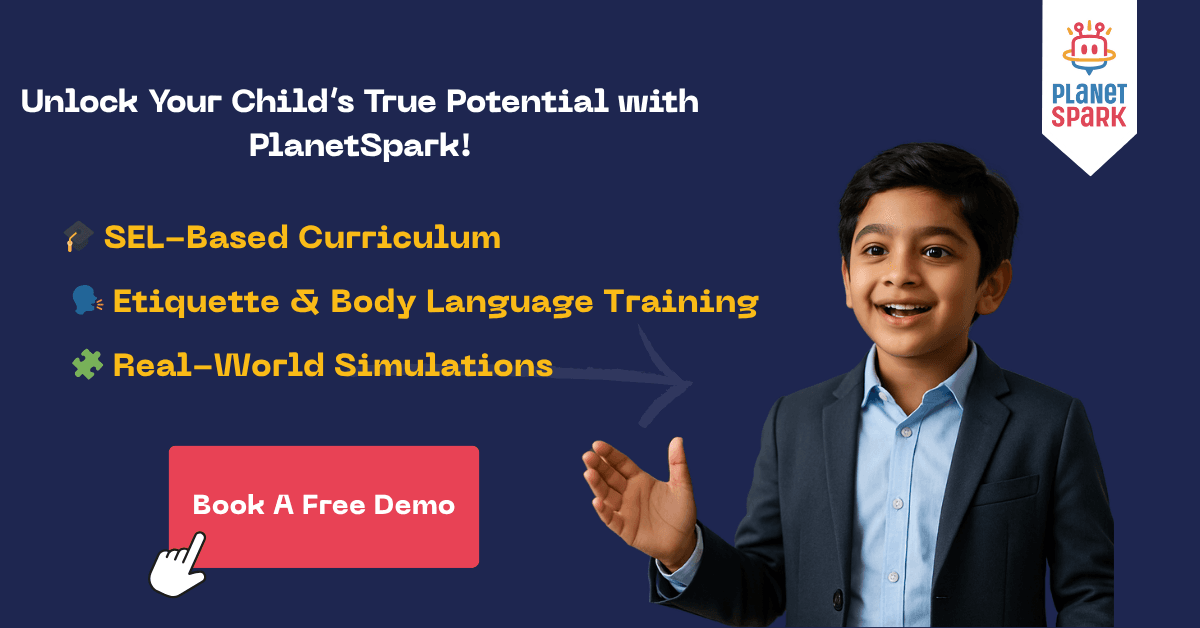Personality Development Meaning: What Parents Must Know
Last Updated At: 19 Jun 2025
13 min read

Table of Contents
- What Is Personality Development?
- Theories of Personality Development
- Key Influencing Factors of Personality Development
- Why Early Personality Development Matters
- Signs of a Well-Developed Personality in Children
- Personality Development Activities for Children at Home
- Why Formal Training Matters
- PlanetSpark’s Personality Development Classes
- Why Try the Free Demo Class at PlanetSpark
- Frequently Asked Questions (FAQs)
- Conclusion
In this comprehensive guide, we’ll explore the true meaning of personality development and why it matters, especially for children. You'll dive into the most influential psychological theories, discover the factors that shape a child’s personality, and understand the importance of nurturing it early. By the end, you’ll also learn how PlanetSpark’s personality development classes can support your child’s journey to becoming confident, articulate, and emotionally intelligent.
What Is Personality Development?
Personality development refers to the process of enhancing and evolving a person’s traits, behaviors, attitudes, and communication to become a more confident, effective, and socially adaptable individual. It is a lifelong process but is especially crucial in the early years of life when foundational traits are formed.
For parents, understanding personality development is essential to nurturing children who are not only academically successful but also emotionally intelligent, confident, and capable of handling real-world challenges. A child's personality affects their social relationships, learning capabilities, leadership skills, and even their mental health.
This guide will explore personality development in-depth, including major psychological theories, influencing factors, the importance of early training, and how structured programs like PlanetSpark's personality development classes can support a child’s growth.
Theories of Personality Development
1. Psychoanalytic Theory – Sigmund Freud
Freud proposed that personality is shaped by the interaction of three components: the id (instinctual drives), the ego (rational self), and the superego (moral compass). He believed that childhood experiences, especially those from the ages of 0 to 6, play a critical role in shaping personality.
2. Erikson’s Psychosocial Development Theory
Erik Erikson expanded on Freud's ideas and introduced eight stages of psychosocial development. Each stage presents a psychological conflict that must be resolved for healthy personality development. For children, stages like “Autonomy vs. Shame” (1-3 years) and “Industry vs. Inferiority” (6-12 years) are especially relevant.

3. Trait Theory – Big Five Personality Traits
The trait theory focuses on identifying and measuring individual personality characteristics. The Big Five traits include:
- Openness: Creativity and openness to new experiences
- Conscientiousness: Discipline and organization
- Extraversion: Sociability and assertiveness
- Agreeableness: Compassion and cooperativeness
- Neuroticism: Emotional stability or instability
Understanding these traits can help parents and educators identify strengths and areas for growth.
4. Social Learning Theory – Albert Bandura
According to Bandura, children develop personality by observing and imitating others, particularly role models like parents and teachers. He emphasized the importance of reinforcement and self-efficacy (a child’s belief in their own abilities).
5. Humanistic Theory – Carl Rogers & Abraham Maslow
Rogers emphasized self-concept and unconditional positive regard in shaping personality, while Maslow highlighted a hierarchy of needs. When basic needs are met, individuals can focus on self-actualization, the highest form of personal development.
Famous Leaders and Their Defining Personality Traits
1. Mahatma Gandhi – The Power of Peaceful Persuasion
Traits: Non-violence, humility, perseverance, empathy, integrity
Why it matters: Gandhi’s ability to lead a nation through peaceful resistance showed how emotional intelligence and self-discipline are powerful leadership tools.
2. Nelson Mandela – Resilience and Forgiveness
Traits: Patience, forgiveness, courage, adaptability, moral conviction
Why it matters: His personality highlighted the strength of resilience, showing children that even adversity can be overcome with character.
3. Dr. A.P.J. Abdul Kalam – The Visionary Scientist
Traits: Simplicity, curiosity, optimism, discipline, compassion
Why it matters: His childlike curiosity and drive to inspire youth show the impact of a well-nurtured personality rooted in lifelong learning.
4. Oprah Winfrey – The Empathetic Communicator
Traits: Confidence, empathy, communication skills, emotional intelligence
Why it matters: Her journey from adversity to global influence underscores the power of self-awareness and expressive communication.
5. Ratan Tata – Leadership with Compassion
Traits: Humility, foresight, integrity, generosity, strategic thinking
Why it matters: Tata’s calm demeanor and ethical leadership remind us that soft-spoken leaders can still command deep respect and impact.
6. Malala Yousafzai – Courage and Advocacy
Traits: Bravery, confidence, passion, purpose, resilience
Why it matters: Even as a teenager, her personality displayed maturity, reminding parents that personality traits can blossom early with the right support.
7. Barack Obama – The Charismatic Leader
Traits: Eloquence, empathy, calmness under pressure, confidence, inclusiveness
Why it matters: His articulate communication and relatability illustrate how personality development enhances leadership and influence.
Key Influencing Factors of Personality Development
Biological Factors:
Genetics, brain chemistry, and temperament play a role in determining personality.
Family Environment:
Parenting styles, emotional warmth, and stability shape a child’s behavior and worldview.
Education & Teachers:
Schools and educators can reinforce discipline, communication, empathy, and leadership.
Peer Groups:
Friendships influence social skills, values, and confidence.
Media Exposure:
Television, internet, and social media affect beliefs, aspirations, and behaviors.
Cultural Context:
Traditions, language, and societal norms contribute to shaping individual identity.
Life Experiences:
Traumas, successes, failures, and adventures contribute to emotional and mental growth.
Why Early Personality Development Matters
The early years of a child's life are a foundational period for shaping their character, communication style, emotional well-being, and overall outlook on life. Investing in personality development during this stage lays the groundwork for success in academics, relationships, and leadership.
- Peak Brain Plasticity: Scientific research shows that during early childhood, the brain is highly flexible and capable of rapid learning. This is the ideal time for children to develop new habits, learn essential life skills, and form positive perspectives that can influence them for a lifetime.
- Early Habits Become Lifelong Patterns: A child’s early behaviors, how they deal with setbacks, express emotions, and interact with others, often become ingrained habits. When these are nurtured positively, they shape the child into a resilient, respectful, and socially skilled adult.
- Builds a Strong Moral Compass: Teaching values like honesty, empathy, perseverance, and responsibility during formative years helps children build ethical foundations. These values guide their behavior, decision-making, and relationships as they grow.
- Boosts Adaptability: Children who are introduced to diverse people, environments, and situations early in life tend to adjust better to changes. Whether it's switching schools, making new friends, or handling unfamiliar challenges, adaptable kids stay confident and calm.
- Improves Learning Outcomes: There is a strong link between personality traits like curiosity, discipline, and resilience and academic success. Children who are well-rounded emotionally and socially tend to stay more focused in class, ask better questions, and maintain self-motivation.
When children receive consistent emotional support, character-building activities, and structured guidance from an early age, they are far more likely to grow into confident, emotionally intelligent, and socially competent individuals who thrive in any environment.
When children receive early guidance, support, and positive reinforcement, they are more likely to become confident, emotionally intelligent, and successful individuals.
Signs of a Well-Developed Personality in Children
Recognizing a child's personality progress is key for parents. Here are signs that indicate your child is developing a strong and healthy personality:
- Clear and Confident Communication: They express thoughts and feelings without hesitation, speak with clarity, and are comfortable in both casual and formal conversations. They can explain their ideas logically and listen actively to others.
- Healthy Self-Esteem: They show belief in their own abilities without being boastful. They accept compliments gracefully, stay motivated even when faced with criticism, and don’t rely heavily on external validation.
- Emotional Maturity: They are able to manage their emotions, recover from setbacks, and respond to challenges calmly. They don’t throw tantrums or overreact, and they show patience in emotionally charged situations.
- Empathy and Kindness: They genuinely care about the feelings of others and take actions to help or comfort peers. They show kindness not only in friendships but also in unfamiliar social settings.
- Accountability: They take responsibility for their mistakes and actions without making excuses. They learn from their errors and make an effort to improve themselves.
- Teamwork and Leadership: They can take charge when needed and also be supportive team members. They show initiative, share credit, and handle disagreements constructively in group settings.
- Optimism and Positivity: They maintain a hopeful and proactive attitude even during failures. They believe that effort leads to improvement and maintain a solution-oriented approach.
- Curiosity and Creativity: They are eager to learn new things and often come up with innovative ideas. They ask thoughtful questions, enjoy problem-solving, and are open to new experiences and viewpoints.
Personality Development Activities for Children at Home
Parents can play a pivotal role in shaping their child's personality through structured yet fun activities:
- Storytelling & Reading: Enhances imagination and language skills
- Journaling: Builds introspection and writing confidence
- Role Play: Teaches empathy and real-world problem solving
- Public Speaking Games: Boosts confidence and articulation
- Emotion Cards: Helps kids identify and express feelings
- Gratitude Journaling: Encourages a positive mindset
- Age-Appropriate Responsibilities: Builds independence and decision-making

Why Formal Training Matters
While home activities are incredibly valuable in shaping a child’s character, they often lack the consistency, structure, and expert guidance that formal personality development classes provide. Professional training offers a holistic and systematic approach to nurturing essential soft skills that are critical for personal and academic success.
In a formal setup like PlanetSpark, every session is designed with specific objectives and measurable outcomes. Certified educators guide children through interactive modules that gradually build confidence, enhance communication, and strengthen emotional intelligence. Unlike home practice, which may be irregular or undirected, these classes ensure continuity, progression, and personalized mentoring based on the child’s unique pace and personality.
Children also benefit from structured peer interactions, regular performance feedback, and goal-oriented assignments. The use of real-world simulations, assessments, and collaborative tasks further enhances their learning experience, making them better equipped to face challenges both inside and outside the classroom.
In essence, formal personality development classes offer the foundation, environment, and expert support required to unlock a child’s full potential in a focused, engaging, and future-ready manner.While home activities are beneficial, professional personality development classes provide a structured, goal-oriented environment where children receive consistent mentorship and feedback.
PlanetSpark’s Personality Development Classes
Curriculum Overview
1. Holistic Curriculum Beyond Academics
PlanetSpark goes beyond academic skills to help children build their overall character. Topics include communication etiquette, self-introduction, goal setting, peer interaction, leadership, self-awareness, and critical thinking—skills essential for real-world success.
2. Social-Emotional Learning (SEL) Based Design
Especially curated for younger learners, the curriculum incorporates emotional awareness, empathy-building, and emotional regulation techniques to ensure children understand and manage their feelings better.
3. Practical, Activity-Based Learning
The classes are filled with hands-on activities like mock interviews, public introductions, journaling, and feedback sharing. Real-life scenario simulations, role plays, and targeted exercises ensure experiential learning and ongoing understanding checks.
4. Leadership & Self-Presentation Training
Through group activities, storytelling, and challenges, children practice critical soft skills such as empathy, responsibility, assertiveness, and teamwork. They also build presence by learning to present themselves confidently through presentations and expressive storytelling.
5. Confidence Meter & Parent Consultations
PlanetSpark maintains a unique 'Confidence Meter' to track student progress in communication and leadership. Regular PTMs allow parents to review these metrics and get expert insights into their child’s development.
6. Etiquette and Body Language Sessions
Children are trained in body language fundamentals such as eye contact, posture, and gestures. They also learn tone modulation and respectful communication key elements of grooming and impression management. PlanetSpark offers a scientifically designed curriculum aimed at nurturing a child’s full potential. The classes include:
Key Features
- One-on-one live sessions with certified teachers
- TEDx-style speaking, storytelling, stand-up comedy, and podcasting modules
- Gamified learning with regular assessments
- Tailored lesson plans for every age group
- Real-world assignments and public speaking challenges
Benefits of Personality Development Classes
- Improved Communication: Children learn how to express their thoughts, feelings, and ideas clearly and effectively. They build a strong vocabulary, learn to listen actively, and gain the ability to tailor their message for different situations skills that are crucial for academic and social success.
- Enhanced Confidence: Through activities like public speaking, storytelling, and interviews, children gradually overcome shyness and stage fright. They begin to trust their voice, develop self-assurance in social situations, and become more comfortable expressing themselves in front of others.
- Academic Excellence: Personality development boosts focus, self-motivation, and discipline, qualities that directly impact academic performance. Children become more curious, proactive in learning, and capable of managing their time and responsibilities efficiently.
- Social Growth: The program nurtures social intelligence by helping children build friendships, cooperate with peers, and engage respectfully in group settings. They learn conflict resolution, teamwork, and empathy-enabling them to thrive in any social environment.
- Leadership: Kids are trained to take initiative, delegate, motivate others, and confidently lead projects or conversations. These leadership traits are cultivated through hands-on practice in debates, group tasks, and presentations.
- Emotional Intelligence: Children develop a deeper understanding of their emotions and learn how to regulate them. They are taught to empathize with others, manage stress, and handle setbacks with grace, key components of resilience and long-term well-being.** Clarity, expression, and vocabulary
- Enhanced Confidence: Overcome stage fear and self-doubt
- Academic Excellence: Better focus, curiosity, and self-discipline
- Social Growth: Build friendships and collaborate effectively
- Leadership: Learn to initiate, motivate, and manage tasks
- Emotional Intelligence: Understand and manage emotions well
Why Try the Free Demo Class at PlanetSpark
PlanetSpark offers a no-cost, no-pressure opportunity to explore the program:
- 1:1 Expert Session: Personalized learning experience for your child
- Skill Assessment: Know your child's strengths and improvement areas
- Parent Feedback: Understand the teaching approach and goals
- Interactive & Fun: Children love the engaging format
- Instant Takeaways: Learn something new in just one class!
Frequently Asked Questions (FAQs)
Q1. What age group is best suited for PlanetSpark’s personality development classes?
A: PlanetSpark’s classes are designed for children aged 4 to 14. The curriculum is customized to match the child’s developmental stage.
Q2. How are these classes conducted?
A: Classes are conducted live and one-on-one through a secure online platform, ensuring personalized attention and learning.
Q3. Do children need to have any prior experience in public speaking to join?
A: Not at all! The program welcomes beginners and gradually builds their skills and confidence.
Q4. How is progress tracked in the program?
A: Teachers provide regular feedback, assignments, and performance reports to parents. Interactive assessments also help track skill growth.
Q5. What topics are covered in the curriculum?
A: The curriculum includes confidence building, public speaking, storytelling, stand-up comedy, debates, podcasting, and leadership development.
Q6. Is the free demo class really free?
A: Yes, the demo class is absolutely free, with no obligation to enroll. It’s a great way to understand the value PlanetSpark offers.
Q7. How can I book the demo class?
A: Simply visit PlanetSpark’s website and fill out the demo class form. You’ll get a call to schedule your child’s session at your convenience.
Conclusion
Understanding the meaning of personality development is the first step toward giving your child an advantage in life. From psychological theories to real-life applications, nurturing a child’s personality requires time, effort, and the right environment.
With the right guidance, such as PlanetSpark’s personality development classes, children can evolve into confident, articulate, and emotionally intelligent individuals.
Don’t wait! Book a FREE demo class today and help your child discover their true potential.
Personalized Communication Report
Record a video to get a AI generated personalized communication report for your child
Select Learner's Class
